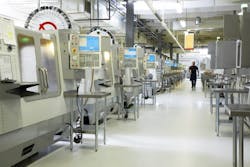One of the hottest terms to arise in manufacturing lately is the term “digital thread.” Essentially, the term refers to digitizing every aspect of product development and manufacturing —from design through production—to enable full access to every relevant piece of data associated with the product for tracking, quality assurance, troubleshooting and maintenance.
It’s one thing to understand the digital thread as a concept. It’s another to see it in action. I had the opportunity to see it during a recent visit to Proto Labs’ manufacturing facility in Plymouth, Minnesota.
Proto Labs is a supplier of on-demand custom prototypes and low-volume production parts. The company has three manufacturing sites in Minnesota, as well as manufacturing sites in Raleigh, N.C., the United Kingdom, Germany, Finland and Japan. Proto Labs produces plastic, metal and liquid rubber silicone parts using a variety of manufacturing processes, ranging from injection molding and CNC machining to 3D printing/additive manufacturing.
Explaining Proto Labs’ operations as an “infusion of software automation into the front end of manufacturing,” Robert Bodor, Proto Labs vice president and general manager, Americas, described how the company can move from file to end part in one day.
A key aspect of this ability is Proto Labs online quoting and ordering capability, which begins the creation of a product’s digital thread. Once a CAD file is uploaded into Proto Labs’ online ordering system, the company’s combination of process automation and production software takes over. The CAD file’s geometry is analyzed, a manufacturing process is calculated, and then quotes are sent to the customer.
Bodor says Proto Labs can offer a firm price for services because “all steps have been pre-calculated” during the online quote-generating process. “We can also provide design-for-manufacturability feedback. The original CAD file is highlighted with areas of concern for manufacturing or appearance,” he says.
With this type of information, design iterations can take place before production begins, which effectively eliminates much of the design risk before any actual costs are incurred.
The digital thread concept at Proto Labs doesn’t just involve the product. It also coordinates and tracks everything and everyone associated with its production. Bodor notes that Proto Labs’ digital thread process includes a scan of the operator’s badge to provide accountability throughout the part’s production. It also addresses quality control aspects and guidance of the operator. “Even down to the selection of which block of material will be used for manufacturing,” says Bodor.
To begin the actual production process for a CNC machined part, for example, the approved design has to be translated into G-code, which will direct the CNC milling machine’s actions. G-code development involves automated geometric reasoning based on the CAD file to determine which machining techniques will work best with various areas of the mold or part. Reach analysis and collision detection are also automatically conducted to determine which end-mills can cut which areas of the material block. A digital toolpath generator then creates a program in the G-code language that Proto Labs’ automated machines understand.
Since limited toolpathing is needed in the additive manufacturing process, a production-ready file is sent from the online ordering system directly to computer-equipped stereolithography, selective laser sintering or direct laser metal sintering machines. Material is then loaded into the machine for automated part production.
Bodor says a standard turn from CAD to mold at Proto Labs is 15 days, but this process can be expedited. “We maintain capacity in our system to absorb custom requests for as little as three days or even same-day production, based on how long it takes to make the molded plastic or liquid silicone part,” he says. 3D printed and machined parts are available in one to three days.
In addition to its highly automated processes, the size of Proto Labs’ production facilities is a major factor in its quick turn, custom part manufacturing capabilities. The company has hundreds of CNC mills, lathes, presses and 3D printers, and is constantly investing in more to stay ahead of customer demand.
Asked what the digital thread concept brings to manufacturing—and Proto Labs specifically—Bodor said, “At Proto Labs, we pair software automation and tracking with a network of more than 600 interconnected manufacturing machines. The digital thread is what ties it all together—from the CAD file, online quote, interactive design feedback, automation of the toolpathing and manufacturing process, to each processing step on the factory floor.The digital thread provides complete traceability, quality control, consistency and scale.It allows us to be responsive to customers, flexible, and make parts the same day they’re ordered.”


